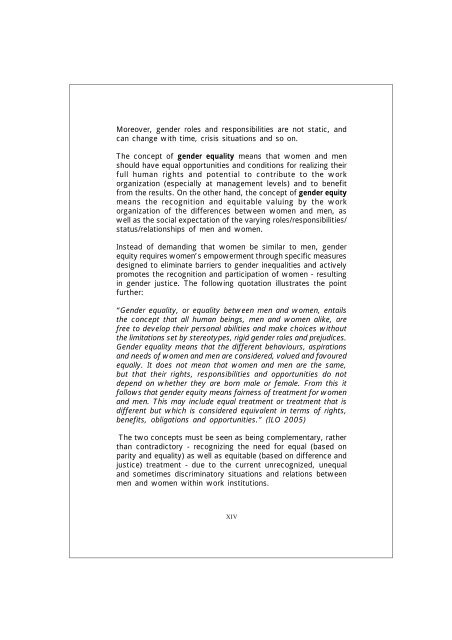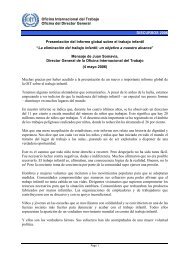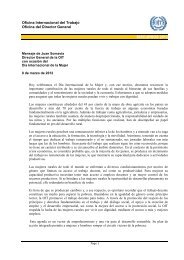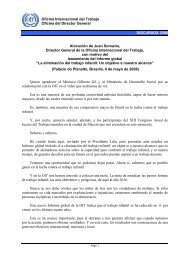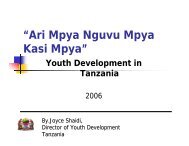Beyond Glass Ceilings and Brick Walls - International Labour ...
Beyond Glass Ceilings and Brick Walls - International Labour ...
Beyond Glass Ceilings and Brick Walls - International Labour ...
You also want an ePaper? Increase the reach of your titles
YUMPU automatically turns print PDFs into web optimized ePapers that Google loves.
Moreover, gender roles <strong>and</strong> responsibilities are not static, <strong>and</strong><br />
can change with time, crisis situations <strong>and</strong> so on.<br />
The concept of gender equality means that women <strong>and</strong> men<br />
should have equal opportunities <strong>and</strong> conditions for realizing their<br />
full human rights <strong>and</strong> potential to contribute to the work<br />
organization (especially at management levels) <strong>and</strong> to benefit<br />
from the results. On the other h<strong>and</strong>, the concept of gender equity<br />
means the recognition <strong>and</strong> equitable valuing by the work<br />
organization of the differences between women <strong>and</strong> men, as<br />
well as the social expectation of the varying roles/responsibilities/<br />
status/relationships of men <strong>and</strong> women.<br />
Instead of dem<strong>and</strong>ing that women be similar to men, gender<br />
equity requires women’s empowerment through specific measures<br />
designed to eliminate barriers to gender inequalities <strong>and</strong> actively<br />
promotes the recognition <strong>and</strong> participation of women - resulting<br />
in gender justice. The following quotation illustrates the point<br />
further:<br />
“Gender equality, or equality between men <strong>and</strong> women, entails<br />
the concept that all human beings, men <strong>and</strong> women alike, are<br />
free to develop their personal abilities <strong>and</strong> make choices without<br />
the limitations set by stereotypes, rigid gender roles <strong>and</strong> prejudices.<br />
Gender equality means that the different behaviours, aspirations<br />
<strong>and</strong> needs of women <strong>and</strong> men are considered, valued <strong>and</strong> favoured<br />
equally. It does not mean that women <strong>and</strong> men are the same,<br />
but that their rights, responsibilities <strong>and</strong> opportunities do not<br />
depend on whether they are born male or female. From this it<br />
follows that gender equity means fairness of treatment for women<br />
<strong>and</strong> men. This may include equal treatment or treatment that is<br />
different but which is considered equivalent in terms of rights,<br />
benefits, obligations <strong>and</strong> opportunities.” (ILO 2005)<br />
The two concepts must be seen as being complementary, rather<br />
than contradictory - recognizing the need for equal (based on<br />
parity <strong>and</strong> equality) as well as equitable (based on difference <strong>and</strong><br />
justice) treatment - due to the current unrecognized, unequal<br />
<strong>and</strong> sometimes discriminatory situations <strong>and</strong> relations between<br />
men <strong>and</strong> women within work institutions.<br />
XIV


